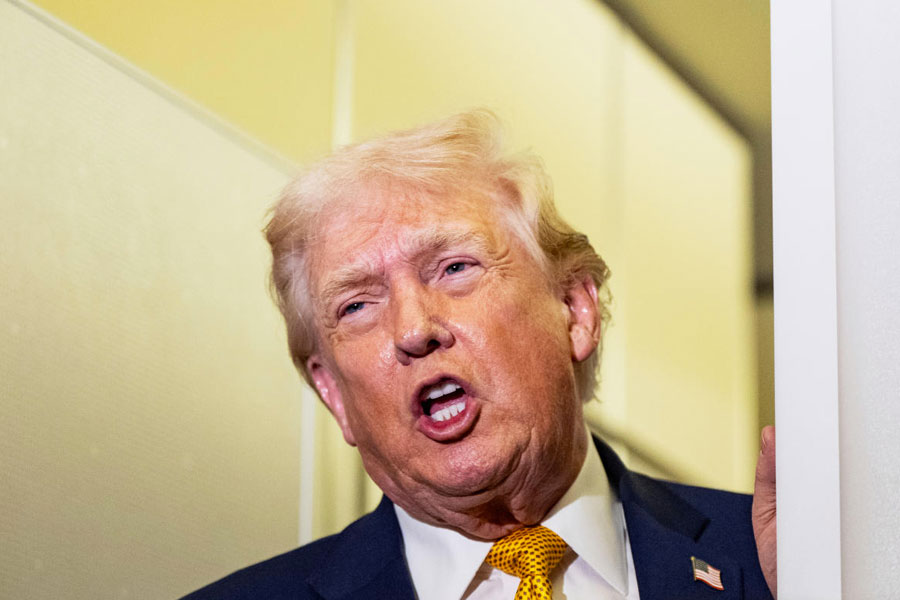 |
The great thing about interviewing speechwriters — in this case an inveterate wordsmith — is that they provide you with helpful tips on headlines. Midway through the 80-minute talk in Mani Shankar Aiyar’s book-lined study, the minister moves to the subject of women wielding power in remote Indian villages. “Eat your heart out, Hillary,” says Aiyar, and then adds, “that can be your title.”
Actually, headlines come tripping a phrase a minute through the interview. Aiyar is at his best — because he is holding forth on his fourth child, a 15-year-old called panchayati raj. “We now have 2.5 lakh panchayati raj institutions, 26 lakh elected rural members and 5 lakh urban members. Of them, 12.6 lakh are women,” he exults, and then recalls the former first lady, desperately seeking power.
It is not easy to make the minister talk on issues other than his pet subject. “It has been some kind of a personal jihad for me for sometime,” he admits. In fact, when the United Progressive Alliance government came to power in 2004, Prime Minister Manmohan Singh had wanted to give Aiyar a “heavy economic portfolio.” He discussed it with Congress president Sonia Gandhi who said, “But Mani’s heart is set on panchayati raj.” So a new ministry was carved out of rural development, and Aiyar became the first ever minister for panchayati raj.
For a while, he was also in charge of petroleum. There was some speculation that he was removed at the behest of the Americans, who were concerned about his support for a proposal for an Iranian pipeline cutting through India. “All that is not true. I was from the beginning given temporary charge of the ministry, and it was taken away when the government had its first major reshuffle after 20 months.” In the last Cabinet reshuffle, M.S. Gill replaced him as the minister for sports — a field that Aiyar has shown little interest in. Aiyar was left with his much-loved baby.
“I think we have made panchayati raj ineluctable, irreversible and irremovable. I am hopeful, even though it appears that I am isolated, that there will be an increasing recognition in all echelons of the need to make the optimal use of panchayati raj. Maximum devolution, as Rajiv Gandhi said, is maximum democracy.”
Aiyar’s words, to an India dancing towards glitz and riches, sound curiously out of place. He talks about a responsive administration, about making administration accessible to the people, and how that is only going to be possible with a representative administration. And he even mentions that bad word of present-day politics — socialism.
“I am still an unreconstructed socialist — but I don’t find my socialism to be irreconcilable with reforms. For panchayati raj can bring the fruits of economic reforms to the one billion Indians who are not in the Ambani family,” he says.
The 67-year-old minister, clearly, is a radical caught in a Doon School uniform. And, curiously, it all began in the Dehradun public school some 50 years ago.
Aiyar was 12 when his father, a well-known chartered accountant, was killed in an air crash. “The family, till then well off, would have completely sunk if it were not for the accidental discovery, several days after his death, of an insurance policy.” The policy enabled his mother to negotiate with the headmaster about reducing school fees. In return, his mother taught at Doon, and her sons became day boarders.
“But being the poorest boy in the richest school, I was struck by the injustice of inherited wealth,” he says. In his last year in school, he became “fairly radical” — and had turned into a “red hot Marxist” by the time he graduated from St Stephen’s college in 1961.
It was, he says, an “acute phase” in world politics. The Berlin Wall came up, it was the year of the Bay of Pigs, Krushchev said “We shall bury you” at the UN and John F. Kennedy uttered four famous words — “Ich bin ein Berliner.”
Aiyar went to Cambridge, joined the Marxist Society and supported Brian Pollitt, son of British Communist Party leader Harry Pollitt, who was an active student politician. “But I also began asking searching questions which weren’t being answered.” What eventually pushed him away from Marxism, he says, was its adherence to violence. “I thought how could I, who couldn’t even eat trout on Fridays because it was served with its head and its beady eye would look directly at me, continue to go down this path anymore?”
So Aiyar did what every bright boy did in the early Sixties — he sat for, and cleared, the Civil Service examinations, and opted for the Indian Foreign Service (IFS). “In Doon School, if you were a complete cretin, you got a job in tea for Rs 4,000. If you were half way to being a cretin, you got a job with a British firm in Calcutta for Rs 2,000 a month. But if you were really a brilliant fellow, you joined the Indian Administrative Services (IAS) for Rs 440 a month.”
But his past came up to haunt him after he had been selected for the IFS. One day, while still in England, he got a telegram saying that he had been rejected. The British Information Service, apparently, had sent a report to the Indian government about Aiyar’s radical days.
Aiyar rushed back to Delhi and did all that he could do get himself reinstated — “and that can lead to a full interview of its own,” he says. “But the happy ending came with a note in a file. The file — and I have seen it — said: ‘I have heard good reports of Mani Shankar Aiyar. He may be taken into the foreign service.’ It was signed Jawaharlal Nehru, 23rd October, 1963.”
But for many years, Aiyar says he was tailed by members of the Indian Intelligence. “I think the Intelligence Bureau ultimately came to the conclusion that I was indeed a Marxist but of the Groucho variety.”
Aiyar knew Nehru’s elder grandson in Cambridge — for there was a time when both he and Rajiv Gandhi were in the university together. Aiyar had, of course, first encountered him as a new boy, three years his junior, at Doon. “Frankly, he knew me in school; I didn’t,” he says.
In Cambridge, Aiyar joined student politics and once even tried to win a presidential contest. Seventeen years after the election, a former diplomat and one of Rajiv’s friends told Aiyar that on the day of the union poll, Gandhi had gone around urging Indian students to vote, pointing out that an Indian was standing for the election.
“Rajiv apparently began his political life by canvassing for me. So isn’t it appropriate that I should be ending mine by canvassing for him,” he says.
His own political life, he holds, revolves around four basic principles — secularism, democracy, non-violence and socialism. His commitment, he adds, evolved during his close interactions with Gandhi. “All this made me a Gandhian, a Rajiv Gandhian,” he says.
Aiyar resigned from the IFS to join the Congress in the late Eighties. Earlier, as a joint secretary, he was put in one corner of the Prime Minister’s Office, he says, to look after a department that was till then being dealt with by a section officer — Rajiv Gandhi’s tours and travels. He travelled across the country with Gandhi and wrote his speeches for him. He also took his own political leap by standing for the Lok Sabha from Mayiladuthurai in Tamil Nadu in 1991. “At some stage you have to graduate from being a speech writer to writing your own speeches.”
That is because, Aiyar reasons, the administrative service, once the true calling of all those who believed in nation building, has ceased being a “genuine” system for public service. “I do not know from among my close circle of IAS and IFS friends of even one child of this generation who has gone into the civil service.” His three daughters are a case in point — the eldest is a lawyer, the second a development consultant, and the youngest a would-be historian doing her PhD at Harvard.
“This explains that the civil service system is not good at delivering development. Therefore, the alternative is through the panchayati raj system. And that is why I think it is this system that will ultimately save this country.”
We are back to where we began. And, predictably, with a nice headline.










